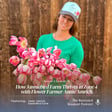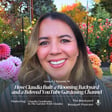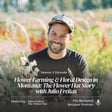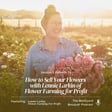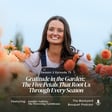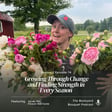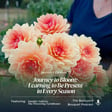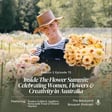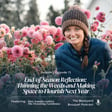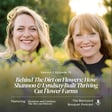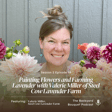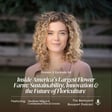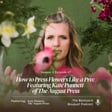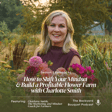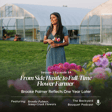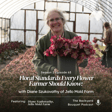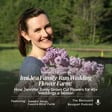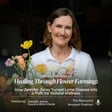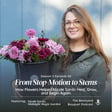
Ep.31: Bokenkotter Blooms: From City Living To A Thriving Cut Flower Farm On 18 Acres
Have you ever imagined leaving the hustle and bustle of city life behind to embrace the serenity of country living? In this episode of the Backyard Bouquet Podcast, host Jennifer Gulizia sits down with flower farmer, Lexi Bokenkotter of Bokenkotter Blooms to delve into her remarkable journey from city living to becoming a successful flower farmer in rural Indiana.
Join Jennifer and Lexi as they chat about the joys and challenges of transitioning from a postage stamp-sized garden to a sprawling flower farm. Lexi shares her passion for sustainable living and community engagement, highlighting her commitment to organic practices and locally sourced compost. Lexi shares how she draws inspiration from fellow flower farmers like Floret and Muddy Acres, and how she has cultivated a diverse crop selection including dahlias, zinnias, cosmos, and more.
In this episode, Lexi discusses her on-farm events, such as U-picks and workshops, and her plans for future expansion.
Tune in to the full episode to be inspired by Lexi's dedication to sustainable farming practices and her flourishing flower farm business. Learn how she navigates the challenges of rural life and find out how she turns her passion for flowers into a thriving business that blooms with beauty and community spirit.
In This Episode You’ll Hear About:
- 00:00:02 - Introduction to Flower Farming in Rural Setting
- 00:05:27 - Making the Leap: Transitioning to Rural Living and Flower Farming
- 00:06:17 - Exploring Property and Initial Plans for Flower Farming
- 00:10:12 - Challenges and Learnings in Starting the Flower Farm
- 00:11:26 - Diversifying Farming Activities: Events and Workshops
- 00:20:03 - Selling Flowers and Engaging with Florists: Business Expansion
- 00:23:39 - Sustainability Practices on the Flower Farm: Eco-Friendly Approaches
- 00:25:43 - On-Farm Events and Vendor Collaborations
- 00:29:08 - Addressing Insurance and Safety Concerns for On-Farm Events
- 00:30:14 - Managing Surrounding Agricultural Practices and Impact on the Flower Farm
- 00:33:02 - Balancing Wildlife and Livestock on the Flower Farm
- 00:34:58 - Challenges and Benefits of Having Animals on the Property
- 00:37:31 - Transition from Goats to Poultry on the Flower Farm
- 00:39:02 - Utilizing Acreage for Cover Cropping and Future Plans
- 00:40:02 - Primary Flower Crops and Expansion into Sunflowers
- 00:41:14 - Variety of Flowers Grown on the Farm
- 00:43:15 - Strategies for Dealing with Pest Control and Organic Practices
- 00:46:15 - Focus on Sustainability and Organic Practices in Flower Farming
Shownotes: https://thefloweringfarmhouse.com/2024/08/08/ep-31-bokenkotter-blooms-from-city-living-to-rural-cut-flower-farm/
Learn More About Bokenkotter Blooms:
- Website: https://www.bokenkotterblooms.com/
- Instagram: https://www.instagram.com/bokenkotterblooms
Other Links Mentioned In Episode:
- Kiss The Ground Movie: https://kisstheground.com/
- NRCS Grant: https://www.nrcs.usda.gov/programs-initiatives/cig-conservation-innovation-grants
If you enjoyed this episode, will you please consider leaving the podcast a review? Your review helps make the podcast more discoverable to others and allows me to continue creating more episodes.
New episodes every week to help keep your garden blooming!
